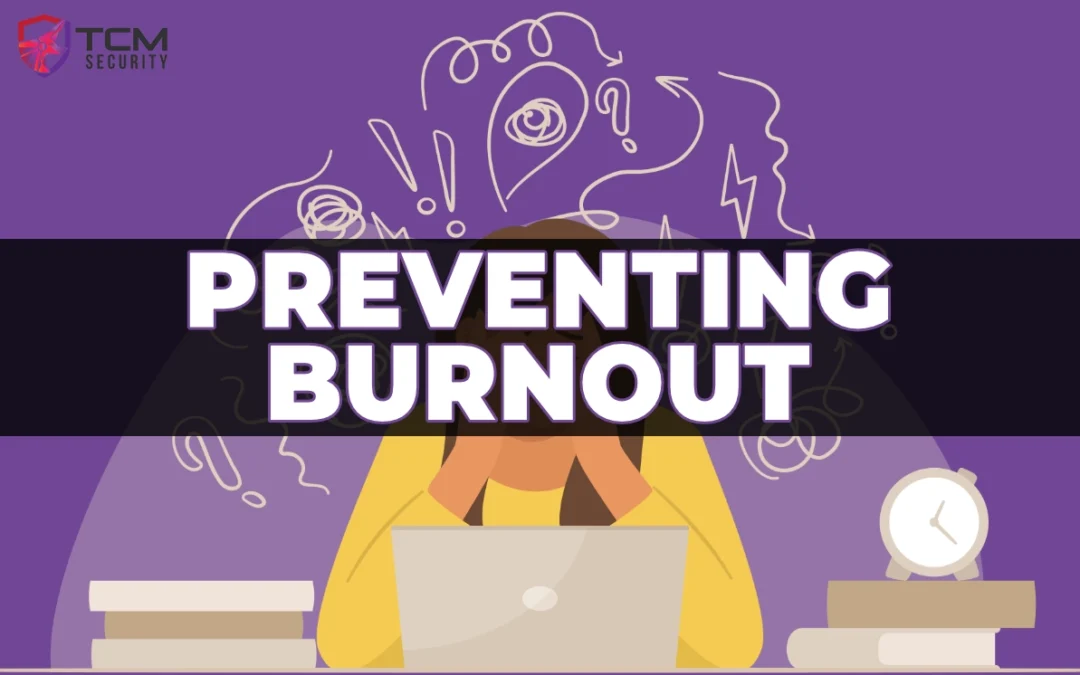Let’s dive into the world of burnout, explore its signs, and most importantly, discuss practical strategies to prevent it. Because let’s face it – we can’t defend against cyber threats if we’re running on empty.
Imagine this- it’s 3 AM, and you’re staring at your screen, eyes burning from the blue light. Another security alert, another potential breach to investigate. Sound familiar? In the fast-paced world of cybersecurity, it’s all too easy to find yourself burning the candle at both ends. But here’s the thing – while our field demands vigilance, it shouldn’t come at the cost of your well-being. It’s crucial to recognize that pushing yourself to the brink isn’t just unsustainable – it’s counterproductive to the very goals we’re trying to achieve.
What is Burnout in Cybersecurity?
According to the World Health Organization, burnout is an “occupational phenomenon” characterized by feelings of energy depletion, increased mental distance from one’s job, and reduced professional efficacy. In the context of cybersecurity, burnout can manifest in unique ways.
The sheer volume of potential threats or the weight of responsibility knowing that a single missed detail could lead to a major security breach can feel overwhelming. Perhaps you’re struggling to keep up with the constant stream of new technologies, or cramming in another study session for that upcoming certification exam. These pressures, combined with long hours and high-stakes decision-making, create a perfect storm for burnout.
It’s important to note that burnout isn’t just “feeling stressed” or “having a bad day.” It’s a chronic condition that develops over time and can have serious consequences for both your career and personal life.
Recognizing the Symptoms of Burnout
The first step in preventing burnout is recognizing its early warning signs. In cyber, we’re accustomed to spotting anomalies and potential threats – it’s time to apply those skills to our own well-being.
Physical and Emotional Indicators:
- Persistent exhaustion that doesn’t improve with rest
- Frequent headaches or muscle tension
- Changes in sleep patterns or appetite
- Increased irritability or emotional outbursts
- Feeling detached or numb
Work-Related Red Flags:
- Dreading logging in or starting your workday
- Difficulty focusing on tasks or making decisions
- Procrastinating on important projects
- Feeling ineffective or doubting the value of your work
- Increased imposter syndrome
- Increased cynicism about the industry or your role
If you’re nodding along to several of these points, it might be time to take a step back and assess your situation. Remember, experiencing these symptoms doesn’t make you weak or incompetent – it makes you human. The key is to address them before they escalate into full-blown burnout.
Strategies for Preventing Burnout
Now that we’ve identified what burnout looks like in our field, let’s talk about how to keep it at bay. Preventing burnout isn’t just about self-care (though that’s important too!) – it’s about creating sustainable work habits and a supportive environment.
1. Set Clear Boundaries
In a field where threats don’t clock out at 5 PM, it’s crucial to establish your own limits. This might mean:
- Defining specific work hours and sticking to them
- Creating a dedicated workspace separate from your relaxation areas
- Learning to say “no” to non-essential tasks or unrealistic deadlines
2. Prioritize Continuous Learning
Stay excited about your work by dedicating time to learn new skills or explore emerging technologies. This not only keeps your skills sharp, but also reignites your passion for the field. I’m a pentester at heart, so training for and achieving the PJPT and PNPT certifications helped bolster my confidence while sharpening my skills.
3. Practice Self-Care
It might sound cliché, but taking care of your physical and mental health is non-negotiable. This includes:
- Regular exercise (even a quick walk can do wonders)
- Mindfulness or meditation practices
- Hobbies and interests outside of cybersecurity
- Adequate sleep and nutrition
Remember, taking time for yourself isn’t selfish – it’s essential for maintaining the sharp mind and quick reflexes our field demands.
4. Leveraging Community Resources
Building an online and in-person support network is absolutely invaluable when it comes to preventing burnout. Remember, you’re not alone in this fight. Don’t be afraid to share your experiences, seek advice, and vent when needed. The cybersecurity community is vast and, more often than not, incredibly supportive. Here are some ways to tap into that collective wisdom and support:
Online Forums and Communities
There are numerous online spaces where cybersecurity professionals gather. These platforms aren’t just for technical discussions – they’re also great for sharing experiences, venting frustrations, and finding solidarity. For instance, TCM Security has a fantastic Discord server where cybersecurity humans can connect with other humans about infosec, mentorship, and career guidance. Some other popular options include:
- LinkedIn cybersecurity groups (Red Society Club and Cyber Security Hub)
- Discord servers (TCM Security, BHIS, Red Society Club, TryHackMe, Hack The Box)
- Reddit’s cybersecurity communities (r/cybersecurity/ and r/netsec/)
- Twitter’s #infosec community
Don’t just lurk – engage! Share your thoughts, ask questions, and offer support to others. Realizing you’re not the only one facing these challenges can be therapeutic.
Mentorship Programs
If you are feeling stuck, a mentor can help you navigate the emotional and professional challenges of cybersecurity. Many professional organizations offer mentorship programs, attending networking events may lead to mentorship opportunities, or even those online communities we just talked about.
And hey, if you’ve been in the field for a while, consider becoming a mentor yourself. Sometimes, the best way to reignite your passion is to help others find theirs.
In-Person Groups and Meetups
Attending groups and local meetups is another great way to form connections with others who understand burnout in the industry. Conferences like DEF CON, Wild West Hacking Fest, and Black Hat offer a unique way to meet fellow cybersecurity folks. In addition, attending in-person meetups like those put on by local BSides groups is a good way to network with people in your area. If you are a student or recent grad, check out university groups. They often host events with employers and job seekers that are open to the general public.
When to Seek Professional Help
Let’s be real for a moment – sometimes, self-help strategies and community support aren’t enough. And that’s okay. Recognizing when you need professional help is not a sign of weakness; it’s a sign of strength and self-awareness.
Consider seeking professional help if:
- Your feelings of burnout persist despite your best efforts
- You are experiencing symptoms of anxiety or depression
- Burnout is significantly impacting your personal relationships or health
- You are having thoughts of harming yourself or others
Remember, mental health is just as important as physical health. Many companies offer Employee Assistance Programs (EAPs) that provide confidential counseling services. Don’t hesitate to use these resources – they are available for a reason.
You Are Not Alone: Burnout Affects Us All
Burnout in cybersecurity is a real threat, but it’s one we can defend against with the right strategies and support. By recognizing the signs early, implementing preventive measures, and leveraging community resources, we can maintain our passion and effectiveness in the field.
Remember, taking care of yourself is essential. You can’t give 100% if you’re running on empty, so make it a priority to recharge regularly.
You deserve to be at your best, so keep your guard up against burnout and be kind to yourself. You’ve got this!

About the Author: Dan Berger
Dan (Dz@$t3r) is a cybersecurity professional and US Air Force veteran, currently a Desktop Support Engineer at TCM Security. Cultivating a passion for penetration testing, he has bolstered his offensive security skills with certifications such as PJMT, PJPT, and PNPT.
When not in cybersecurity mode, Dan lets his creative side loose as a metal vocalist and multimedia artist. Whether producing music, film, or graphic design, his creative curiosity matches his passion for offensive security.
Combining equal parts cyber skill and artistic creativity, Dan brings a unique perspective to the world of cybersecurity.
About TCM Security
TCM Security is a veteran-owned, cybersecurity services and education company founded in Charlotte, NC. Our services division has the mission of protecting people, sensitive data, and systems. With decades of combined experience, thousands of hours of practice, and core values from our time in service, we use our skill set to secure your environment. The TCM Security Academy is an educational platform dedicated to providing affordable, top-notch cybersecurity training to our individual students and corporate clients including both self-paced and instructor-led online courses as well as custom training solutions. We also provide several vendor-agnostic, practical hands-on certification exams to ensure proven job-ready skills to prospective employers.
Pentest Services: https://tcmdev.tcmsecurity.com/our-services/
Follow Us: Blog | LinkedIn | YouTube | Twitter | Facebook | Instagram
Contact Us: sales@tcm-sec.com
See How We Can Secure Your Assets
Let’s talk about how TCM Security can solve your cybersecurity needs. Give us a call, send us an e-mail, or fill out the contact form below to get started.

